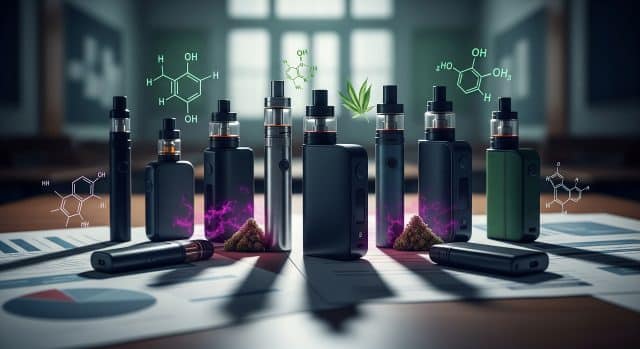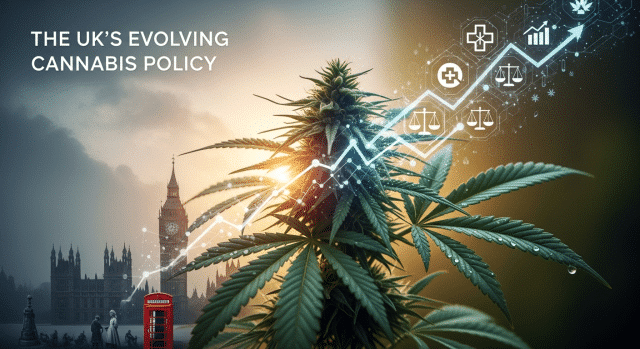UK Government to Ban HHC and Review THCa: What It Means for UK Shoppers & Retailers
The UK Government has accepted expert advice to ban HHC (hexahydrocannabinol) and other semi-synthetic cannabinoids (SSCs) by bringing them under the Misuse of Drugs Act 1971 as Class B / Schedule 1 substances. In the same package, ministers will consult on controlling THCa (tetrahydrocannabinolic acids A & B) before legislating, given their ease of conversion to THC.
Dame Diana Johnson DBE MP, the Minister of State for Policing and Crime Prevention, confirmed the Government accepts the ACMD’s recommendations and will implement them “when parliamentary time allows”. The consultation will specifically cover THCA-A and THCA-B to reduce unintended impacts on legitimate industries.
What exactly is being banned?
The Advisory Council on the Misuse of Drugs (ACMD) recommended naming a list of SSCs for control, including HHC, HHCP, HHCH and several hydroxy-HHC variants, alongside 11-OH-THC. Crucially, it also recommended that THCA-A and THCA-B be brought under control due to their ready conversion to psychoactive THC (e.g., when heated). Read the document created by the Advisory Council on the Misuse of Drugs ‘Semi-synthetic’ Cannabinoids
What about THCa right now?
THCa is not yet controlled, but the Government will consult on adding THCA-A and THCA-B to Class B/Schedule 1 and then legislate. Businesses and consumers should expect the legal position to tighten and plan accordingly.
Will the law go wider than named compounds?
Yes. Beyond the specific list, the Home Office will update the UK’s “generic text” for cannabinoids so that other psychoactive SSCs are also captured in future, closing loopholes as the market evolves.
What happens next?
-
Legislation: Named SSCs (including HHC) are set to be scheduled; THCa controls will follow a short consultation.
-
Guidance & education: Official sites like FRANK are being updated so the public, retailers and clinicians understand the new rules and health risks.
-
H4-CBD review: The Government accepted ACMD advice to test whether H4-CBD is covered by the Psychoactive Substances Act (PSA).
UK ‘Zero THC’ Rules for CBD Products — What You Need to Know
In recent months, the UK’s regulatory stance on THC content in CBD products has sharpened. While trace amounts of THC have long been tolerated under strict limits, there’s growing emphasis on products carrying “zero detectable THC”, particularly for CBD isolates and broad‑spectrum formulations.
Under the Misuse of Drugs Regulations (2010), a CBD product remains legal as long as no controlled cannabinoid (THC, THCV, CBN) exceeds 1 mg per final container. The familiar “0.2% THC” guideline refers solely to permitted hemp varieties for cultivation—not product safety thresholds.
On the food safety front, the FSA has introduced a daily safety limit of 0.07 mg of THC (roughly 1 µg/kg per day for a 70 kg adult), effective for ingestible novel food products.
Industry groups like the ACI (Association for the Cannabinoid Industry) are pushing for clearer rules—their proposal? A total daily limit of 50 micrograms of controlled cannabinoids, rather than per serving or unit. This would bring much‑needed clarity for branding and compliance.
Together, these measures reflect a shift toward greater consumer safety and better labelling transparency. For Weed Supermarket, emphasise products that truly meet “zero detectable THC” standards, backed by third-party lab certificates and compliant with both MDA exemptions and FSA novel-food criteria.
Weed Supermarket’s stance
We support clear, science-led rules and will always align our range with UK law and best practice. If you’re a consumer or trade buyer, steer clear of HHC/SSC products and keep an eye on THCa updates as the consultation proceeds. For any product we stock, we’ll continue to only source with lab reports and lawful formulations designed for the UK.






One comment
Lady Lu Cuthbert
05/10/2025 at 16:05
My Chronic Pain and Anxiety Disorder has become worse over time
I am a Survivor of 21yrs Domestic Violence and that has left me Fully Disabled leaving me with 27 bones broken from my face to my Feet
I’ve had to have Surgery to repair my Body-2 knee replacements and 2 hip replacements thanks to Baseball Bats being used on me
There are a lot of Bones that can’t be repaired and I also have Mental Health issues including Server PTSD which we don’t know all my triggers
The reason I have told you this is because the Medication I received does not help me control the Pain IT controls Me Until I came across Weed Supermarket and the Help of the team behind it!!
I use them because it doesn’t take away my Pain but it helps me Manage/Control it for a few hours of relief!
I want to Thank you ???? Weed Supermarket for your Support and I hope one day our Government will legalise Medical Marijuana as the USA has to be able to have the THC legal which means that it will be able to help us who need it with Chronic Pain and Mental Health issues
I wish those in Government could walk in my Shoes for 24 hrs to understand the Necessity of the use of what We need instead of not Understanding the Benefits of the Use of it all
I hope this makes sense to you who reads this post- mean while I again Thank Weed Supermarket and will absolutely recommend them to anyone who has any Issues with Health and Pain Relief
Thank you for your time
Take Care x